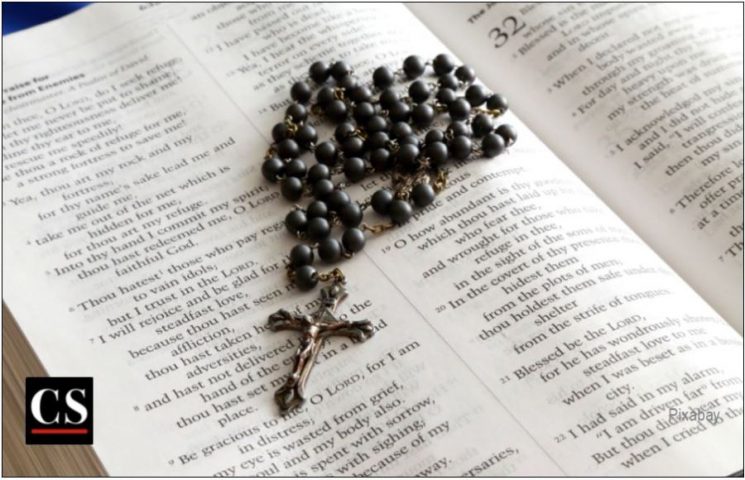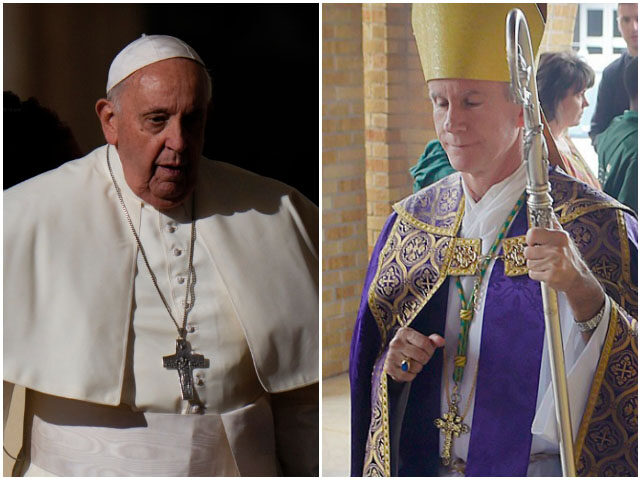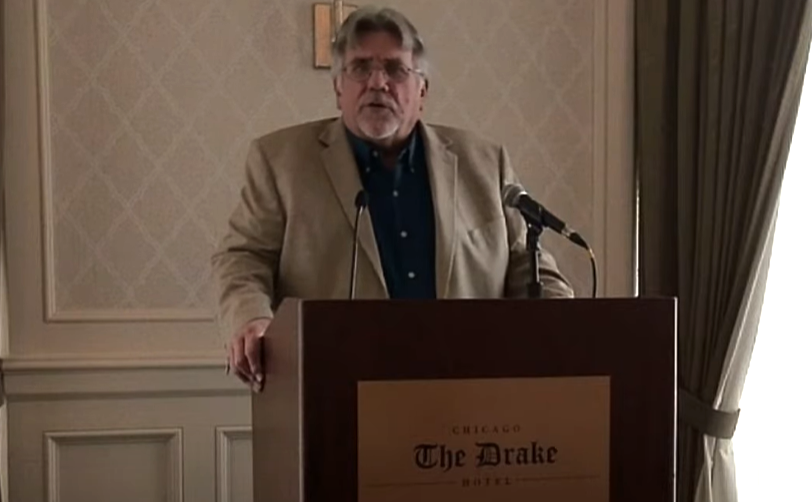The Hail Mary, a Biblical Prayer to the Mother of God

Planned Parenthood’s Annual Evil: Pray to End Abortion—and Its Funding
January 18, 2018
Fr. Mike Schmitz: Inspiration to Stop Complaining (Video)
January 18, 2018
By Ray Sullivan, atholic Stand, December 21, AD2017
 The “Hail Mary” is one of the most beautiful prayers in the world. It combines the words of the Archangel Gabriel (who is a messenger from God), the words of St. Elizabeth (the mother of John the Baptist, who was filled with the Holy Spirit while still in her womb), and ends with a very powerful petition for our mother Mary to pray for us always, especially at the hour of our death, when Satan will make his most powerful attempt to deceive us one last time.
The “Hail Mary” is one of the most beautiful prayers in the world. It combines the words of the Archangel Gabriel (who is a messenger from God), the words of St. Elizabeth (the mother of John the Baptist, who was filled with the Holy Spirit while still in her womb), and ends with a very powerful petition for our mother Mary to pray for us always, especially at the hour of our death, when Satan will make his most powerful attempt to deceive us one last time.
The Incarnation of Jesus Christ in Mary’s womb is a very special part of the Bible. It is the dividing line between the Old and the New Testaments. The Old Testament is the time before, while the New Testament is the time after, Jesus comes into the world. Every devoutly-said Hail Mary is recalling that very special time in history when the first words of salvation by St. Gabriel appeared in the New Testament, which fulfilled the Old Testament prophecy of the promised Messiah.
The Archangel Gabriel’s Greeting
Prior to appearing to Mary, the Archangel Gabriel was last seen in the Bible in Daniel 9:20-29, when he foretold that the Savior of mankind would be born in “69 weeks of years”, which is “bible-speak” for 483 years (69 x 7). Daniel lived almost 500 years before Jesus, so this prophecy was fulfilled by Mary’s giving birth to Jesus. Thus, Gabriel was not only personally involved with the prophecy of the Messiah to Daniel, but also with announcing its fulfillment to Mary.
St. Gabriel in Luke 1: 26-37, also used a royal greeting for Mary, when he said “Hail” (“Ave” in Latin). This term “Hail,” as in “Hail Caesar” or “Hail, King of the Jews,” wasn’t used for peasants. It is a term used for royalty, as it was used here for Mary, the Queen of the King of Kings. This is why the bible says that Mary was troubled by this greeting. Notice too, that Gabriel did not address her by her name of Mary, but rather by her new title, “Full of Grace” (“gratia plena” in Latin). To be “full of grace” means that there can be no room for sin anywhere in your body or soul. We know that the more grace one has, the less sin one has: “For sin will have no dominion over you, since you are not under law but under grace. (Romans 6:14)
St. Gabriel, in relaying God’s message to Mary (an angel is God’s messenger), next said to her, “The Lord is with you.” This is a very powerful statement, coming before she conceived Jesus in her womb. In other words, God had handpicked her from all women from all eternity to be the Mother of Jesus. This statement by Gabriel before the incarnation means that Mary wasn’t holy just because she had Jesus living in her for 9 months; rather, she was already holy before that. Also notice the word “is” in Gabriel’s statement (not “was” or “is now but not forever”). By using the word “is,” St. Gabriel is inferring that the Lord was with Mary then, and He still is with Mary, forever.
Some people dismiss the Blessed Virgin as just an ordinary woman randomly chosen by God to be an “incubator” for Jesus. But no one refers to their own mother as an “incubator,” so why would one assign this pejorative to Mary? The answer is that some people mistakenly believe that to downgrade Mary’s importance in salvation history is to somehow elevate Jesus. They don’t realize that Mary was the very first Christian and the very first evangelist, as well as the mother of God. To put down Mary is NOT in accordance with Luke 1: 46-48, “all generations will call me blessed.” Mary is the only human being in the Bible (except for Jesus) who makes this claim about herself.
Elizabeth’s Greeting
Next in the Hail Mary, we hear the words of Elizabeth, “Blessed are you among women, and blessed is the fruit of your womb,” (Luke 1:42). Elizabeth was already pregnant with John the Baptist, who the angel said would be filled with the Holy Spirit while still a “fetus” in his mother’s womb (Luke 1:13-15). This filling of John with the Holy Spirit took place at the sound of Mary’s voice (Luke 1:44). Notice how this part of the prayer, which quotes Elizabeth, identifies both Jesus and Mary as blessed! So now we know that Mary is blessed among all women, even more blessed than our own mother, who we are commanded to honor by the 4th Commandment. If Mary is more blessed than our own mother, then how much more should we honor her, the woman chosen by God to be His living tabernacle for 9 months? And the term “among women” should also remind us of the Song of Solomon, which talks about the “fairest among women”. Verses 1 and 9-10 say:
Whither has your beloved gone, O fairest among women? Whither has your beloved turned, that we may seek him with you?
My dove, my perfect one, is only one, the darling of her mother, flawless to her that bore her. The maidens saw her and called her happy; the queens and concubines also, and they praised her. “Who is this that looks forth like the dawn, fair as the moon, bright as the sun, terrible as an army with banners?”
Notice these verses talk about the fairest among women being flawless (immaculately conceived and sinless), as well as “bright as the sun”. “The dawn” is when the sun comes up and lights up the world, and Mary brought forth “the Son”, who is the light of the world. A thousand years later St. John wrote of Mary’s being “clothed with the sun, and with the moon under her feet” (Revelation 12:1). If the maidens, queens, and concubines praised her, then so should we!
And notice how Elizabeth calls Jesus “the fruit of her womb”. That calls to mind another verse from the bible, “So, every sound tree bears good fruit, but the bad tree bears evil fruit. A sound tree cannot bear evil fruit, nor can a bad tree bear good fruit.” (Matthew 7:17-18)
So if Jesus is the good fruit of Mary’s womb, then, according to the Bible, Mary has to be a sound tree, that is, sinless and holy. If she were sinful, then it would have been impossible for her to bear the good fruit of the sinless Jesus Christ.
The Final Petition of the Hail Mary
The final part of the Hail Mary does not come directly from Scripture as do the first two parts. Rather, it is a petition: “Pray for us sinners, now and at the hour of our death, Amen.” Students of this prayer will realize that we are only asking Mary to pray for us, which is intercessory prayer, lauded by St. Paul in 1 Timothy 2:1. Non-Catholics sometimes mistakenly believe that we are praying to Mary as if she were some kind of stand-alone goddess, but that is because they are ignorant of Catholic teaching. The word “pray” only means to ask, as in “Pray tell, what are you doing?” or as Lot said to two angels,
“My lords, turn aside, I pray you, to your servant’s house and spend the night, and wash your feet; then you may rise up early and go on your way.” (Genesis 19:2)
Heavenly Intercessors, Most Especially Mary
God has always chosen to use people for his intermediaries, whether it’s Abraham, Moses, Jacob, Joseph, Isaiah, Elijah, Peter, Paul, or Mary. Jesus is the one mediator between God the Father and man, but Mary’s role is to cooperate through intercessory prayer and thus lead us to her Son Jesus, who then shows us The Father. This is no different from your spouse or your pastor leading you to Jesus, who then leads you to The Father. Everyone should use intercessory prayer to lead sinners to Jesus.
However, some will say, “Mary is dead and can’t hear our prayers” and “She doesn’t know what’s going on down here on earth”. That is totally unbiblical. In contrast to such claims, Jesus said, “Now he is not God of the dead, but of the living; for all live to Him.” (Luke 20:38) and “Just so, I tell you, there will be more joy in heaven over one sinner who repents than over ninety-nine righteous persons who need no repentance.” (Luke 15:7) These verses prove that the so-called “dead” Christians (dead in the body does not equal dead in the soul), who are in heaven, know what’s going on down here on earth, because they are rejoicing over our turning away from sin. Also, Paul says in Hebrews 12:1 that they are our witnesses! Witnesses must be alive and aware of what’s going on in order to witness for us!
From the Bible, we know that saints who have died and who have gone to heaven are one with Christ, and are partakers in His divine nature. They are not isolated individuals, but they are one with Christ:
“But he who is united to the Lord becomes one spirit with him.” (1 Corinthians 6:17)
“by which he has granted to us his precious and very great promises, that through these you may escape from the corruption that is in the world because of passion, and become partakers of the divine nature.” (2 Peter 1:4)
Conclusion
We know that (1) Mary is the bride of the Holy Spirit (because Jesus was not the illegitimate son of Mary), (2) Mary and Jesus shared the same body and blood while on earth (because Jesus was inside of Mary’s womb), and (3) in heaven, Mary is not only one in spirit with Jesus, but she is also a partaker of His divine nature. Why would any Christian hesitate to ask for such a holy person’s intercession? St. James notes, “Therefore confess your sins to one another, and pray for one another, that you may be healed. The prayer of a righteous man has great power in its effects.” (James 5:16)
The real “Bible Christian” not only accepts Mary as his mother (John 19:27 and Revelation 12:17) because he wants to have Jesus as his brother, but he will always ask Mary for her very powerful prayers and intercession with her Son. As the King of Israel, Solomon, could not refuse the Queen Mother Bathsheba anything (1 Kings 2:20), just so, Solomon’s successor on the throne of Israel, the King of Kings, Jesus, will not refuse anything to the Queen Mother of Heaven (Revelation 12). Look how Jesus obeyed her when the wedding feast ran out of wine at Cana, even though it was not yet His time (John 2: 1-11)!
Catholics agree completely with Gabriel concerning Mary, “Hail Full of Grace! The Lord IS with you!”
_________________________




